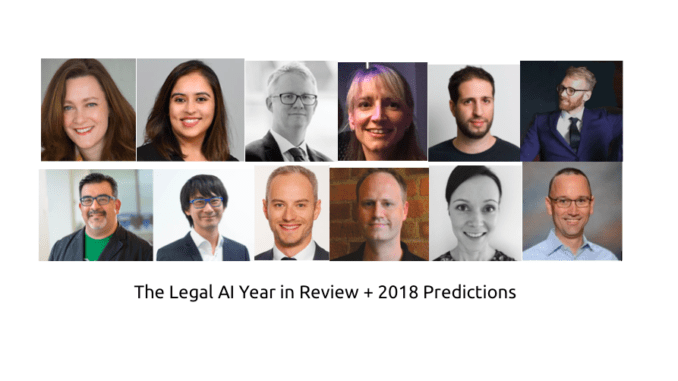
It’s been an incredible year for the ‘New Wave’ of legal technology and Artificial Lawyer has hopefully been able to bring you some of the key moments in this evolutionary journey that is unfolding week by week all around the world.
Now, as we head toward 2018, many of the leading players and commentators in the legal AI, legal bot and data analysis world have been asked to give their views on what has taken place and what will happen next. Plus, next year there will be predictions from the world of smart contracts and legal blockchain, (Hi, Clause, Integra Ledger and IBM’s Cognitive Legal team, to name a few!)
Artificial Lawyer asked an array of experts to name what was the biggest development for legal AI and the New Wave of legal technology this year, and what they expected to see happen in 2018.
They were invited to respond with text or images to illustrate their views, and if they were up for it, a haiku or longer poem. Naturally, we couldn’t fit everyone in – the legal tech world is just so massive now – but hopefully you’ll find this collective wisdom both inspiring and thought-provoking – and fun – I know Artificial Lawyer did. Please enjoy!
First off, Nick West, Chief Strategy Officer, of pioneering law firm Mishcon de Reya and creator of its MDR LAB legal tech incubator.

Biggest development of 2017: ‘I think the most significant thing was how mainstream legal AI became – mass adoption by firms and NewLaw, and more focus on integrations, grown up security requirements, APIs and the like.’
Biggest development of 2018: ‘I think we’re going to see more news about wider ML applicability, not just NLP/ML for litigation document review, contract review in diligence and in-house contract review (the primary use cases to date).
We’ll see broader use cases across the business and practice of law. E.g. for classification of documents in early stage litigation (where Brainspace, NexLP and others play); for classification of time recording entries (disclosure: that’s part of PING’s offering [one of MDR LAB’s start-ups]); for a host of compliance use cases (including GDPR); and for improving lead generation/marketing efforts.
Actually, I think AI will be overshadowed next year. 2018’s buzzword will become Smart Contracts. I fear we’ll endure a year of bluster about how smart contracts will ‘revolutionise’ the practice of law, forcing many of us to play a game of ‘hunt for the actual near term, monetisable use case’.’
Thanks, Nick. That breaks the ice and gets things rolling.

Biggest development of 2017: ‘The hype [around AI].’
Biggest development of 2018: ‘Less focus on hype and more attention to wicked problems that AI is enlisted to help solve.’
—
Now, Richard Mabey, Co-Founder of Juro, the contracting automation tool with an AI edge.
Biggest development of 2017: ‘Hitting the top of the hype curve and the narrative then shifting to what AI tools can actually deliver.’
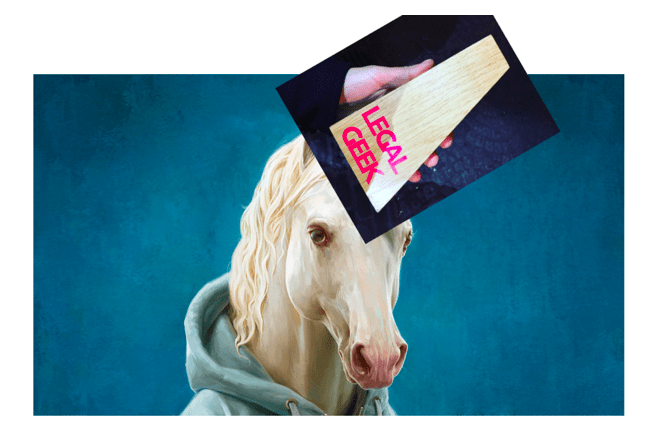
Biggest development of 2018: ‘The in-house counsel market will start adopting AI tools like it’s going out of fashion.’
—
And now onto some of the legal AI companies that have really shaken up the document review space this year. Let’s start with, Emily Foges, CEO of Luminance and the company’s founding figurehead, Mike Lynch, of Invoke Capital.
Biggest development of 2017: ‘Over the past year, Artificial Intelligence has been a force for change in the legal profession. This technology has finally become accessible for firms who don’t intend to devote resources to lengthy design, customisation and training projects, and the impact on law firm economics are transformative.
Dr Mike added: ‘This has been the year when the public has realised we have far less to fear about robots taking over the world.’
‘General AI is very difficult. However, we’re seeing credible commercial applications of narrow AI. These usually automate laborious, repetitive tasks and we are already seeing the effects that this is having on the legal profession.’
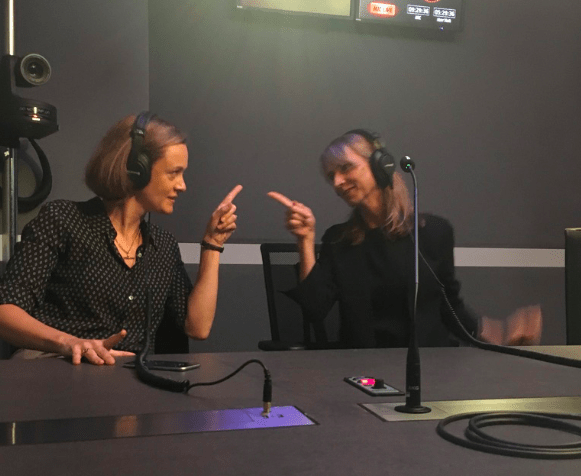
Biggest development of 2018: ‘Looking ahead, with a new generation of true machine learning that can learn and adapt in a similar way to the human brain, we will see an even greater appetite for technology that is easy to adopt and no longer requires lengthy, customised solutions.’
—
And now the recently revealed legal AI dark horse, Eigen Technologies and its Co-Founder, Dr Lewis Liu.

Biggest development of 2017: ‘In 2017 the industry has made unprecedented gains in both the scale of deployments and extraction accuracy, along with reducing training data requirements.’
Biggest development of 2018: ‘We are going to see a big increase in the connection of machine learning with qualitative and quantitative data, as part of the broader qualitative data revolution. There will be a big push towards the training of legal AI technology being truly user-led.’
‘We will also see even greater scale and integration in the market, which may drive greater liquidity in previously illiquid assets such as non-performing loans. This will be one of the drivers that will cause financial services to increase its lead over the legal sector in AI technology, both in adoption and impact.’
—
And, of course, no discussion of the legal AI market would be complete without the insight of Kira Systems, which has blazed a trail across 2017, picking up clients at a growing rate around the world. Here is the team and CEO Noah Waisberg’s contribution, in the shape of a really excellent graphic.
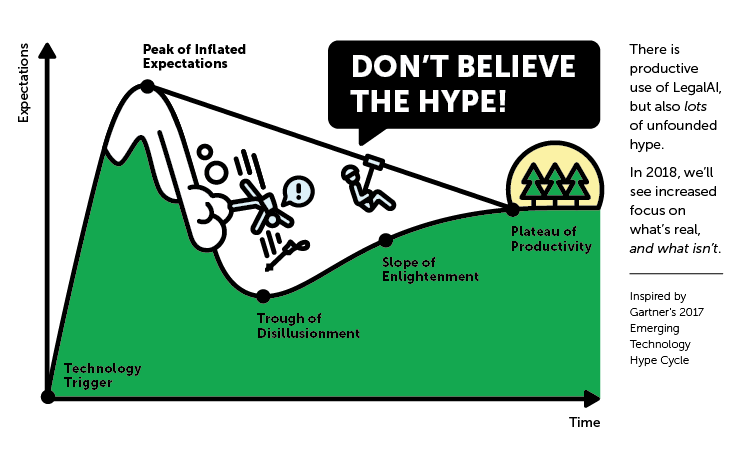
—
Thanks very much for that, Kira Systems! Looks like we are now heading for the plateau of productivity in 2018.
And, now here is Peter Wallqvist, VP of Strategy at iManage/RAVN. (In fact, if there is one story that really stands out from 2017, the merger of RAVN and iManage would have to be on the shortlist for sure.)

Biggest development of 2017: ‘In 2017 companies realised that rather than being a vague cure for anything and everything, AI’s real value came from its ability to solve practical, real-world business problems. In fact, AI will actually become less visible in many cases, as it is more tightly integrated into the applications that people use everyday.’
‘Without even realising it, they will find that AI enables them to be more productive, and frees them to spend more time on strategic business initiatives rather than tedious tasks. As we approach 2018, practical AI will continue its takeover.’
Biggest development of 2018: ‘In 2018, technology industry leaders and even AI customers will increasingly find it valuable to integrate disparate AI technologies. As AI becomes less siloed, they will discover that when these different AI technologies are integrated, they can deliver more than the sum of their parts.’
‘Additionally, we will see AI become a crucial part in security programs. Organizations will see more integration of AI into security and information governance technologies in order to lower the risk of and damage from cyberattacks. When it comes to detection of breaches, AI will be increasingly utilized to automatically build rules to identify user patterns, so that deviations in behavior that indicate a breach or malicious behavior can be detected.’
Thanks, Peter and iManage/RAVN, some excellent insights there as always.
—
Next up, another of Canada’s pioneering legal tech companies, in this case, legal AI doc review company, Diligen and its Co-Founder, Laura van Wyngaarden.
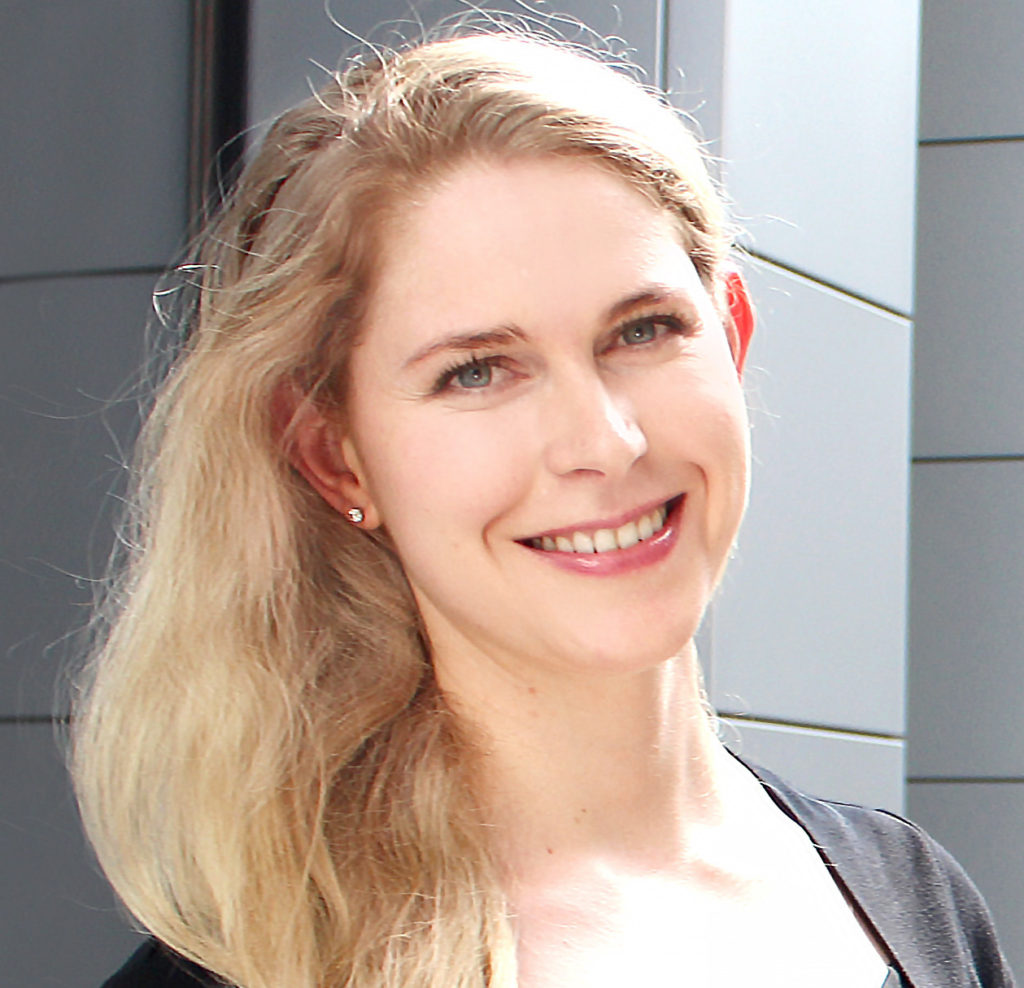
Biggest development of 2017: ‘In 2017, there was a lot of interest in AI and what it might mean in the legal space — and definitely some hype and confusion about what exactly constitutes AI. The interest was encouraging, and a lot of companies and law firms have been studying the legal tech players and seem more open to incorporating AI into their practice areas.’
‘It was also a turning point for legal teams who were feeling pressure from clients around fees and their innovation strategy and the worry that they’d be left behind if they didn’t explore and implement AI solutions.’
Biggest development of 2018: ‘In 2018, we expect to see lots of implementations, not only by large firms, but more widespread adoption by firms and teams of all sizes who will see using AI as a standard part of their workflow. Doing contract review with the assistance of AI will become the new normal.’
‘Firms will feel the pressure from clients around their practices and will adopt legal tech solutions to make them more efficient and keep costs down. We also expect to see AI as a key recruiting tool for top talent. Firms without these types of legal tech tools will be left behind in 2018.’
—
And now, for one of the highlights of this review. A brilliant poem from Jutta Kamp at legal AI company, Seal Software.

AI is fast, AI is clever
AI is effortless, however
Here and there is a CLO
Who feels technology’s a foe
In 2018 Legal goes lean
With the support of a machine
That searches analyses more
extracts clauses in contracts corps
shows you insights shows you money
Makes your CPO so sunny
Hackers too are fast, hackers, too are clever
Rogue AI will maliciously endeavour
To reverse-engineer and decompile
Insider assault on your transaction file
Where personal data is precarious
Chatbots’ underlying means prove nefarious
AI’s other job will be
Protecting data as owned IP
And as AI and blockchain coalesce
So emerges a spawn with far more finesse
Old school problems to undress
Extract and analyse to impress
Intelligent contracts are smarter than smart
They follow standards and will impart
A way for technology and standards to merge
The Intelligent Contracts’ upsurge
In the halcyon of blockchain’s command
With end-to-end-encryption to further expand
Contracts remit in AI Neverneverland
Legal goes backroom to boardroom
For the LPO does it spell doom?
The year that AI goes mainstream
This is the outlook of our 2018 dream
Machine learning breakthroughs coming in
AI’s this story’s clever heroine.
–
Wow, thanks, Jutta for this. A really excellent poem about legal AI and where it’s heading. And how about those amazing rhyming couplets as well…!

Rounding off the doc review group, here is Noory Bechor, co-founder and CEO, LawGeex.
Biggest development of 2017: ‘2017 was the year of the legal AI hype.’
Biggest development of 2018: ‘2018 is going to be the year where the dust starts to settle, and customers begin to understand which AI solutions are actually working and can efficiently solve real-world problems. AI will continue to make fast progress in terms of accuracy and we will see more evidence that AI can actually do some legal tasks better than human lawyers.’
Looks like the ‘moving beyond the hype’ is becoming something of a theme here. Guess that all bodes well for 2018.
—

And, now moving beyond doc review into AI-driven legal research, and that naturally leads us to the one and only, Andrew Arruda, Co-Founder of ROSS Intelligence.
Biggest development of 2017: ‘I think the most significant developments included a legal technology AI company, ROSS, being named by CB insights as one of the top 100 private AI companies in the world and that proof of AI’s transformative power in law began to be shared in the form of case studies from ROSS including this video and this one too.’
Biggest development of 2018: ‘We are now seeing companies in law re-brand and slap AI into their marketing material whereas before, folks were in a wait and see formation to see how big of an impact AI would have. You see the big players now saying they are doing AI, or that they have been all along, despite early on writing dismissive marketing material about AI and smaller outfits rushing to rebrand their engineers and data scientists as machine learning folks.’
‘It’s fun to see the industry change and adapt and as my grandfather always said, imitation is the sincerest form of flattery. I look forward to other ROSS-type named products getting some sentences in legaltech media pieces in 2018, while ROSS continues to build cutting-edge products, enhance lawyers on the front lines in their practices and ultimately, gain more and more market share.’
AND……..ROSS has also provided us with a haiku, for which they receive special kudos.
“AI is here now
ROSS Intelligence leads way
law forever changed?”
Thanks for that! (I think we should have a regular AI haiku spot, don’t you?)
—
And, keeping it original, here is Toby Unwin, Co-Founder of legal data analysis company, Premonition, who responded with several pictorial quotes, of which this one seemed the most fitting.
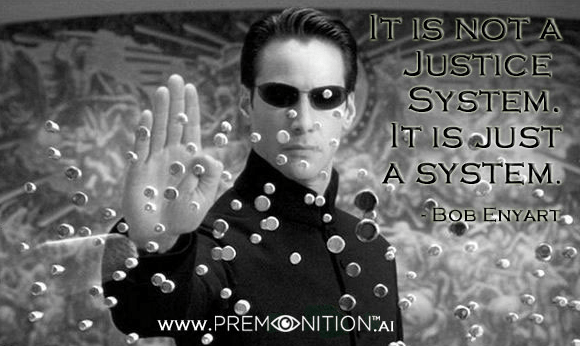
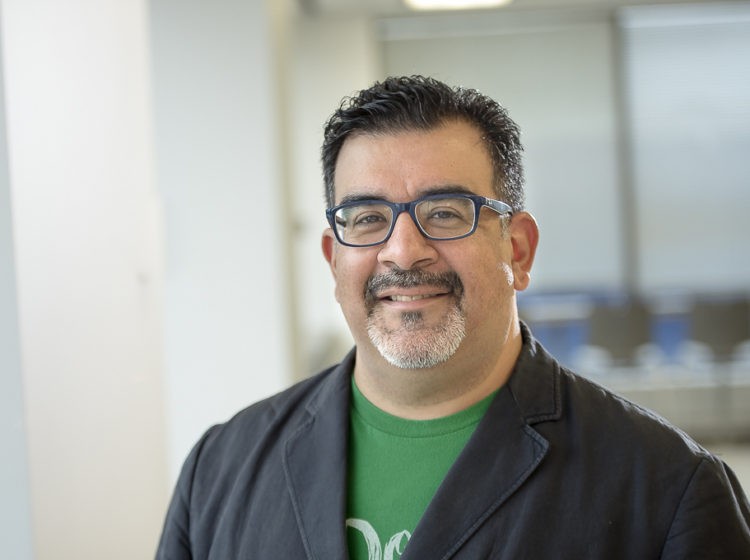
Awesome. Thanks, Toby. Artificial Lawyer would certainly choose the blue pill.
And now let’s bring on the bots with none other than Tom Martin, founder of LawDroid.
Biggest development of 2017: ‘The most significant development of 2017 for AI was the fact that it is now being taken seriously as an agent for positive change.’
Biggest development of 2018: ‘2018 will offer an explosion in AI voice-enabled legal tools and functionality that provide useful assistance (not just fancy gizmos) to lawyers and regular people alike.’

And, from the other side of the Pond, here’s Stephen Ward, another bot maker, this time with a focus on the world of barristers, with his Billy Bot, which operates from his Clerksroom site. (N.B. it has been suggested that Billy looks like Sue Perkins, a British TV personality. What do you think?)
Biggest development of 2017: ‘The most significant advance in legal AI in 2017 is the entry price to start playing. Platforms allowing you to plug in and get started with AI means that anyone can now play with this area. Exciting times.’
Biggest development of 2018: ‘The most significant change is acceptance that AI is now a standard part of systems design and every firm or chambers will use AI in one form or another going forwards. AI is now the norm.’
—
And now moving from little, old Billy to the massive Thomson Reuters. Artificial Lawyer managed to cajole the excellent, Maniti Barot, Director, Pangea3/Legal Managed Services, to share her views.

Biggest developments of 2018: ‘From an overall TR perspective, 2018 will be about automation (documents, governance and guidance), AI (taking our know-how products to the next level) and analytics (horizon scanning, making data-driven decisions) with integration of content and software.’
‘For our Legal Managed Services (Pangea3) ALSP business in particular, 2018 will be us as the legal-AI (L-AI) enablers. Even though several use cases have been explored, L-AI has not yet made a dent as big as it possibly can, whether in the contract automation, due diligence, auto-abstraction, compliance or e-discovery/predictive coding world.’
‘We expect that in 2018, outsourcing to non-law firm vendors such as us will only increase, given that this year even though this method was ranked the highest in effectiveness to achieve efficiency and cost control, but it was one of the least-used tactics.’
Sounds like big things await Thomson Reuters in 2018, thanks, Maniti. Of course, if we talk to TR, we also must include LexisNexis, which has thrown itself fully into the world of machine learning and NLP applications.
Jeff Pfeifer, VP Product Management at LexisNexis, and Josh Becker, CEO of Lex Machina, have produced an array of predictions for 2018, of which below is an edited version.
Biggest developments of 2018 (will include….among others)

‘The rise of augmented intelligence in place of artificial intelligence: Artificial Intelligence has taken a bit of a hammering in the media due to an innate concern that AI is more of a threat than an asset. The result is that we are seeing the legal industry move away from the term, embracing ‘augmented intelligence’ in its place.’
‘Greater Integration of legal technologies across the entire legal workflow will deliver greater efficiencies: In order for the vision of the data-driven lawyer to be realized, existing technologies must be linked together and integrated across the entire legal workflow.’
‘Chatbots enabling greater access to the law: The role of chatbots helping consumers gain greater access to the law is an increasingly important area of focus. The fact is legal services can be expensive and, for many people, effectively inaccessible. Chatbots offer an innovative approach to providing legal information – offering consumers the option of quick, easy and economical access to legal information, for which they might otherwise have to retain a lawyer.’
‘Search becomes conversational: The rise of chatbot frameworks and machine learning enabled knowledge graphs promises significant improvements to traditional search. Indeed, the search of the future is likely to be conversational between human and service rather than simple query and answer.’
Wow! Thanks, Jeff and Josh, those are some excellent predictions.
—
And now, time to come back to the people who are using all of this technology and without whom there probably would not be a legal AI sector: the law firms.
Let’s start with international insurance law firm, Kennedys, which operates in a space that has seen a strong appetite from clients for efficiency gains and tech-driven insights. In this case, the insights are from Karim Derrick, the firm’s Head of R&D, (and isn’t that a great job title in a law firm…? Every law firm should have a head of R&D, just ask experts such as Dan Jansen at Nextlaw Labs who Artificial Lawyer remembers saying how amazed he was at how little money is invested – or at least used to be – on innovation at law firms. Though, it looks like all of that is changing now.)

So, what’s been on Karim’s mind? How does he see things evolving?
‘It always was about the data, but it seems that the industry is now waking up to that fact. Meanwhile AI is likely to continue to be over-hyped in the short term. Many of the solutions that offer genuine machine intelligence will continue to be narrow in scope, limited by data. Solutions that help to make up for quality deficiencies of data will be the stepping stone to more interesting AI in the future.’
‘System integrations and the use of Application Programming Interfaces (API) will be more common place. The days of massive investment in monolithic systems is in decline.’
‘Blockchain has the biggest potential to make an impact in the long term, certainly at the legal and insurance service intersection. In 2018 we’ll see more practical applications. The potential for technology to go beyond simply making existing practice more efficient and instead transform our industry is profound, 2018 could see activity on the ground catch up with the hype!’
Excellent, thanks. And now to global law firm, Freshfields, that has made a huge effort this year to both engage internally and externally in relation to the New Wave of legal tech. The firm’s Isabel Parker, Director of Legal Services Innovation, and Oliver Bethell, Head of Strategy & Architecture, very kindly took some time out of driving change to contribute.

First up, Isabel,
Biggest developments of 2017: ‘Discovering the true value of AI – which for us at Freshfields meant moving away from point solutions and linking together AI systems to deliver tangible client benefit.’
Biggest developments of 2018: ‘Greater collaboration and integration between providers of AI to create end-to-end solutions to solve legal problems.’
And now, Oliver,
Biggest developments of 2017: ‘While the last firms finally announced their first play in AI, the early adopters started buying into tech businesses – it’s changing the model.’
Biggest developments of 2018: ‘The AI products will improve quickly again and vendors will start to go direct to clients, cutting out the law firms for very basic work.’
Thanks, Freshfields! One of many law firms, from Slaughter and May, to Allens in Australia, to Davis Polk in New York, to be embracing legal AI tech and automation.
—

The penultimate contribution is by Artificial Lawyer’s Nordic friend and ally, Fredrik Svärd, Founder of Legaltech.se. It’s been a busy year for legal AI in the Nordic region and Fred has this to say:
‘Legal tech went from obscurity to mainstream in Sweden this year with seminars and conferences popping up, news coverage in mainstream media and quite a few firms investing in AI tools. The latter will now have to figure out how to put them to use.’
‘There are quite a few initiatives outside the realm of due diligence and document automation – such as an AI-based insurance company, a blockchain-based land registry and a digital arbitration institute. We still haven’t seen any real efforts to modernize the court system, sadly. Internationally, 2018 might just be the year buyers actually start pressuring lawyers to become more efficient. Also, I think we’ll see more international players targeting the Nordic market next year.’

Thanks, Fred! Looking forward to more Nordic-Tech developments in 2018.
And, to round off proceedings, here is Nick Watson, CEO of Ruby Datum, and founder of the LawTech London group. Take it away, Nick:
Biggest developments of 2017: ‘I think DoNotPay and its expansion into solutions for key legal challenges beyond just parking fines. While the underlying technology isn’t as complicated as some other AI software out there, it marks a significant milestone in the legal world, and I think it’s the first of many to disrupt the industry with free (or discounted) automated support that traditionally we would usually pay good money to a lawyer for.’
Biggest developments of 2018: ‘More consolidation of the legal world through automated tools. I think we’ll see the traditional need of lawyers to provide certain services such as conveyancing or divorces start to decline.’
Thanks, Nick. You could well be right.
And that’s all folks. Tomorrow we’ll be publishing the Artificial Lawyer Christmas Quiz to keep you all entertained over the holidays. But otherwise, thanks for reading and see you all in 2018!
—
A last word from the Founder of Artificial Lawyer.

Thanks very much to everyone who took part in this review and predictions piece. That there are so many excellent contributions here – and that they are just a small fraction of everyone now involved in the New Wave of legal tech – is testament to how much things have changed in a very short space of time.
What’s clear from the views above is that if 2017 was the year of AI hype, then 2018 will really be the year of law firms and corporate legal teams settling down into implementing real use cases across the business. It will also see management teams no longer seeing AI and automation as something to delegate to the IT department, but to treat it as something that will, in time, transform their firm and their client relationships.
In short, the New Wave of legal tech, i.e. technology that performs legal work, or, to put it another way, helps to industrialise the legal world, is of huge strategic importance. To think of AI and automation as an ‘IT issue’ is to miss 90% of the outcomes. It looks like this realisation is now starting to sink in across the global legal market. And that’s a great way to end 2017.
So, to conclude, thanks again to all of Artificial Lawyer’s readers. Without you, your interest, your huge efforts in pushing forward the evolution of the legal market then none of this would be possible.
I wish you all a very happy Christmas, a restful holiday period and a prosperous New Year!
3 Trackbacks / Pingbacks
Comments are closed.